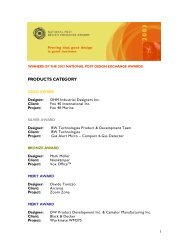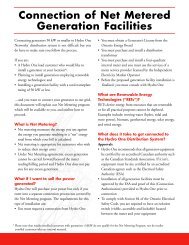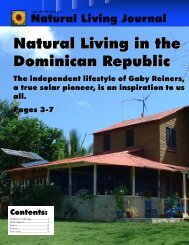Volume 3 - Program & Project Ideas (PDF - 4.5 - Natural Life Network
Volume 3 - Program & Project Ideas (PDF - 4.5 - Natural Life Network
Volume 3 - Program & Project Ideas (PDF - 4.5 - Natural Life Network
You also want an ePaper? Increase the reach of your titles
YUMPU automatically turns print PDFs into web optimized ePapers that Google loves.
<strong>Natural</strong> Resources Canada – Community Energy Systems<br />
R.1.4 Economic development and recycling<br />
- Case study: Newcastle, England<br />
The Newcastle Schools Recycling <strong>Project</strong> locates recycling facilities in the city's schools<br />
so that pupils, teachers, parents and the local community can be encouraged to dispose of<br />
both school and domestic waste in a responsible way.<br />
• The project contributes to education and awareness building, which may curb<br />
garbage going to landfills.<br />
• The sale of recycled materials generates income for 'spin off' projects such as<br />
tree planting, school ground development or other environmental/education<br />
projects.<br />
Source: Local Management Government Board. 1997. Newcastle Schools<br />
Recycling <strong>Project</strong>. ICLEI case study. http://www3.iclei.org/egpis/egpc-103.html. For additional<br />
information, contact Chris Cox, Environment Co-ordinator, Newcastle City Council, c/o<br />
Newcastle Healthy City <strong>Project</strong>, 16 Great North Road, Newcastle Upon Tyne, NE2 4PS, Tel:<br />
0191 221 0135; fax: 0191 232 3917.<br />
R.2.1 Efficient waste and recycling collection<br />
Recycling depot in St Peter’s, Cape<br />
Breton<br />
- Case study: Helsinki Metropolitain Area, Finland<br />
Residents in the Helsinki Metropolitain Area separate organic waste from mixed refuse,<br />
and the municipality collects the organic waste during its regular garbage collection. The<br />
organic waste is transported to a composting field near the landfill, where it is composted<br />
in open pits. It takes about one year for the waste to decompose into soil. Depending on<br />
the quality of the final product, it is used for either soil improvement or landscaping<br />
projects.<br />
• This has substantially reduced landfill loads and produced useable soil.<br />
• Efficient use is made of limited landfill space.<br />
Draft 4/11/2005 103






